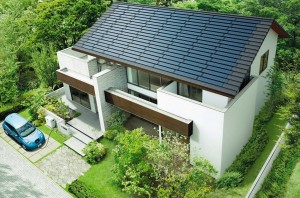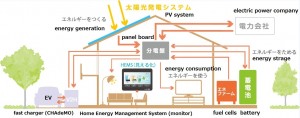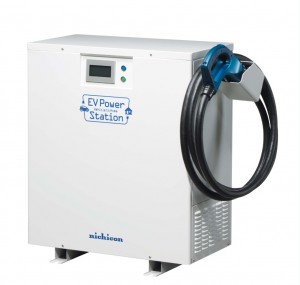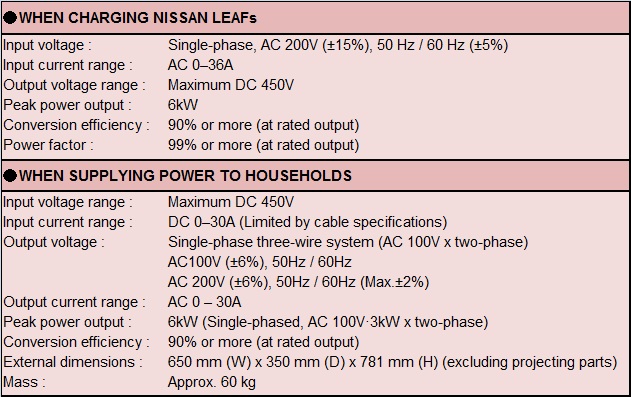Kikuo Hayakawa, NOST Tokyo
Originally published on the site of NL Agency.
Summary
Japanese house maker Sumitomo Forestry Co., Ltd. began to sell a new smart house, ‘Smart Solabo’, on July 6, 2012. Smart Solabo is the first smart house in Japan which can accept electricity from batteries onboard an electric vehicle (EV), using a vehicle-to-home (V2H) power supply system. The V2H system has been firstly developed by Nichicon Corp. in cooperation with Nissan. It was released on May 30, 2012. Currently, Nissan LEAF is the only car which can supply electricity to the smart house. With the V2H system, Sumitomo Forestry expects to increase their smart house sales in Japan. Nichicon plans to sell ten thousands of units of the V2H system with Smart Solabo and possible home renovations until March 2013.
Details
In the past Sumitomo Forestry Co., Ltd. has contributed to the reduction of CO2-emission by using sustainable woods and suitable energy management system to provide an energy-saving house. Now, Sumitomo Forestry’s Smart Solabo is the first smart house in Japan which can supply electricity from batteries onboard an EV car, using a vehicle-to-home (V2H) power supply system. Smart Solabo allows residents to use electricity from a photovoltaic (PV) system, a unit of fuel cells (called Ene-farm in Japan) and a home battery (12kWh or 4.8kWh) (Fig.1 and 2). It can charge batteries onboard an EV car with the electricity generated by the PV system. It has a home energy management system (HEMS) for residents to monitor the flow of electricity at home. The price of Smart Solabo is roughly 250 thousands euro with a 130 m square space and the installation of the V2H system, PV panels and HEMS. The V2H system only accounts for ten percent of the total price of the house. The price will increase by ten percent or more when fuel cells and home batteries are installed additionally. Sumitomo Forestry has a target that smart houses such as Smart Solabo account for sixty percent of all houses which they will sell in Japan in the near future. With the new V2H system, it expects to trigger an increase in sales (1).
V2H system
The V2H system, the world’s first power supply system from EV to home, has been developed by Nichicon Corp. in cooperation with Nissan (Fig 3, Table 1). It is also a fast charger based on the Japanese EV standard ‘CHAdeMO’. It can fully charge an EV in four hours. Currently, Nissan LEAF is the only car which can be connected to the V2H system to supply electricity for the smart house. Nissan LEAF has a capacity of 24kWh batteries onboard, which allows the average Japanese family to consume electricity for two days. The V2H system is expected to contribute to the peak shift of the electricity demand. The price of the V2H system is about three thousands euro including the installation cost, after roughly the half of the unit cost is financed by the Japanese government. Nichicon plans to sell ten thousands of units of the V2H system with Smart Solabo and possible home renovations until March 2013 (2).
Fig 1. Sumitomo Forestry’s smart house – Smart Solabo (source: Sumitomo Forestry Co., Ltd.)
Fig 2. Power lines of Smart Solabo (source: Sumitomo Forestry Co., Ltd.)
Fig 3. Nichicon’s Vehicle-to-home (V2H) power supply system (source: Sumitomo Forestry Co., Ltd./ Nichicon Corp.)
Table 1. Specification of Nichicon’s V2H system (source: Nichicon Corp.)
Currency
1 Euro is 96 Japanese Yen (as of July 27, 2012)
Source
(1) Sumitomo Forestry Co., Ltd.’s press release (in Japanese)
(2) Nichicon Corp. – LEAF to Home power station, May 30, 2012











